
THEATRES OF THE ABSURD
Two political deaths within a day afforded a salutary reminder of the use and abuse of power.
They are an unlikely couple to be joined at death. Vaclav Havel, the dissident playwright and reluctant president and Kim Jong-il, the overfed and egomaniacal leader of North Korea, a man without a shred of irony in his personality. The only thing they truly had in common was the timing of their death: over the same weekend in December 2011.
Some people describe themselves as 68ers, baby boomers who joined in the global leftist and student riots of 1968 and whose liberal politics are still informed by the experience. A new generation may more readily identify themselves as 89ers: those whose first engagement with dramatic political change was forged in the heady, intoxicating days of 1989 as communist rule in Eastern Europe crumbled in spectacularly rapid fashion. For such people, Havel remains the poster boy.
As a public intellectual, he was subject to imprisonment, intimidation and surveillance for years until he could become the figurehead for the Velvet Revolution, helping to spare the country from the bloodshed Romania suffered only weeks later. Hesitantly at first, he took up the intangible reigns of power that only become available in a time of revolution when no one knows who is properly in charge. The early days of his democratic presidency were marked by an endearing awkwardness, the body language at State functions betraying the sense that he had somehow found himself the lead role in one of his absurdist plays
Kim Jong-il took up authority on his father’s death in North Korea a year later than Havel, in 1994. Their peculiar dynastic Stalinism has visited a terrible punishment on a benighted people. To gain an insight into the reality of life in North Korea, there is no better read than Barbara Demick’s ‘Nothing to Envy’ (Granta, 2010). Demick spoke at length with refugees who escaped to South Korea and recounts in understated prose the bitter and unyielding cruelty of a famine which was, like Mao’s and Stalin’s beforehand, a consequence of central policy. The natural aspirations of North Koreans to grow up safely, be paid a fair wage, fall in love and have a family are familiar material, but at every point these hopes are dashed with often callous intentionality. Meanwhile Kim Jong-il was able to satisfy his sophisticated palate with food sourced from across the world. Opponents were liquidated, two hundred thousand political prisoners were allowed to languish in the gulags and Christians came in for especially severe punishment. The whole tale feels a relic from the by-gone era of last century’s communist excesses, yet it may extend into this one.
It is too easy to dismiss this conveniently packaged morality tale as the product of one good man and one bad man, for there are wider questions to address. In one case, communist ideology afforded space for one man’s power lust. Some may argue, strictly, that communist theory should not allow for such excesses, but vast concentration of power in the centre encourage the ancient human tendency to self-aggrandisement. In all its most extreme forms, political ideology gives spurious permission to criminals to do what in other circumstances would be breaking the law. The temptations to personal advancement prove too great. As the prophet Samuel observed of the nascent monarchy in ancient Israel, any such king, unencumbered by law or custom, would amass power and wealth at the expense of the people (1 Samuel 8:10-18).
There are blessings attendant on the dispersal and balance of political power. Human sin is thus constrained. In advanced polities it is perhaps impossible to avoid considerable aggregations of power by the centre in order to promote human justice and welfare, but this necessity should be checked by measures of accountability and transparency. Neither of these principles sounds biblical on the face of it, but they point to aspects of God’s judgment and light which flourishing societies do well to embody.
Vaclav Havel understood this. The courage he showed in telling tru
th to power as a dissident was translated into a political imperative when president. There must be space in public life for authorities to be told uncomfortable things. Those who cut off this avenue eventually delude themselves that all is right among the citizenry because no-one close by has the courage to tell them differently. Havel was also deliciously ironic. He could not be otherwise, exercising such imagination in his art. Even among the democratically elected, there is an acute risk of pomposity. On arriving at his vast presidential palace, Havel found it took him unconscionably long to walk its corridors and so he bought a scooter, just like an enthusiastic child who dashes to primary school. Some felt it unbecoming of a president. Others (this author included) loved him for it and – absurdly – will remember this one detail as long as the heroic dissidence that led up to it.
POPULAR ARTICLES

Obama's Covert Wars
The use of drones is going to change warfare out of all recognition in the next decades.

Through A Glass Starkly
Images of traumatic incidents caught on mobile phone can be put to remarkable effect.

What Are British Values?
Is there a British identity and if so, what has shaped the values and institutions that form it?


